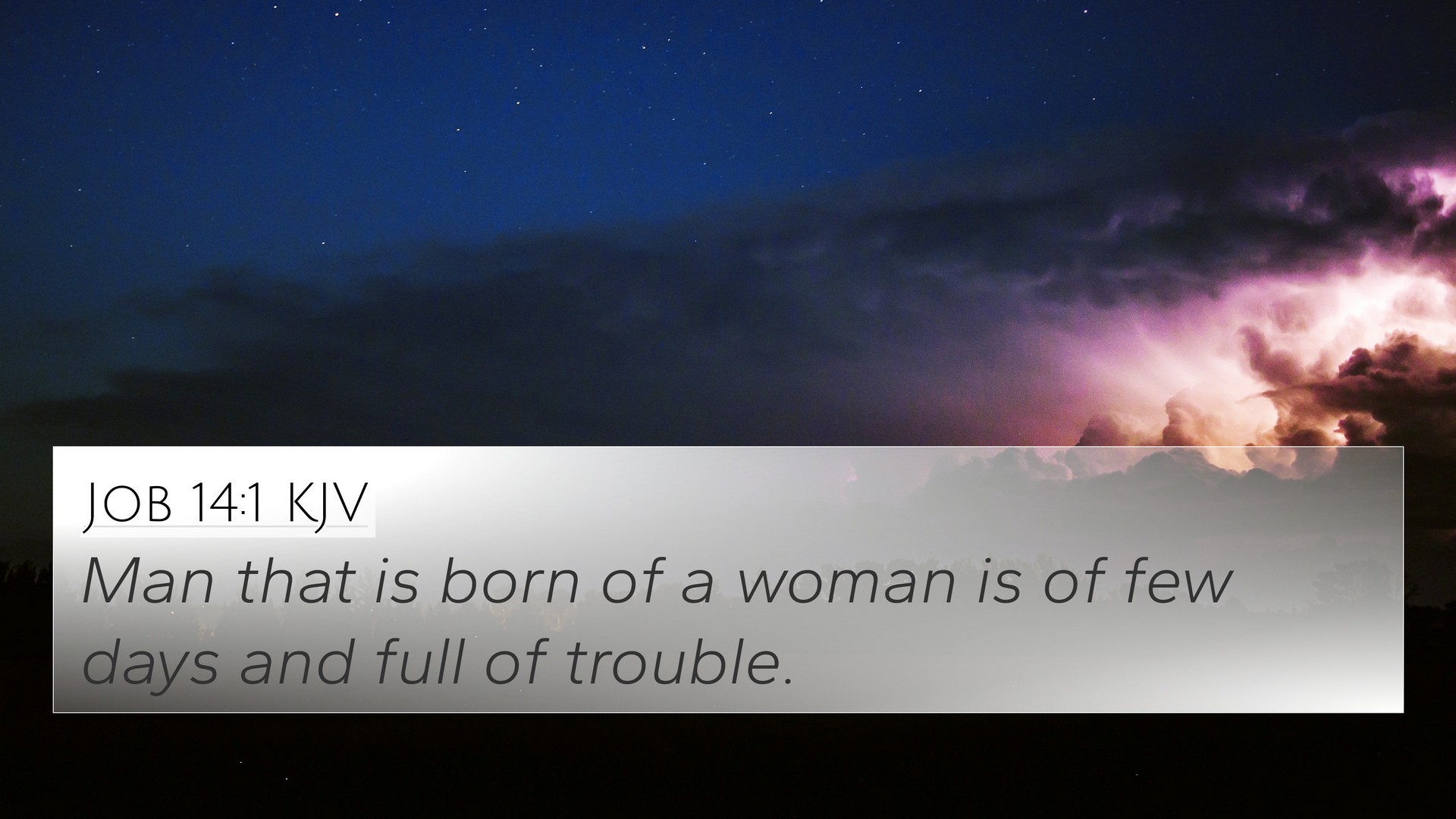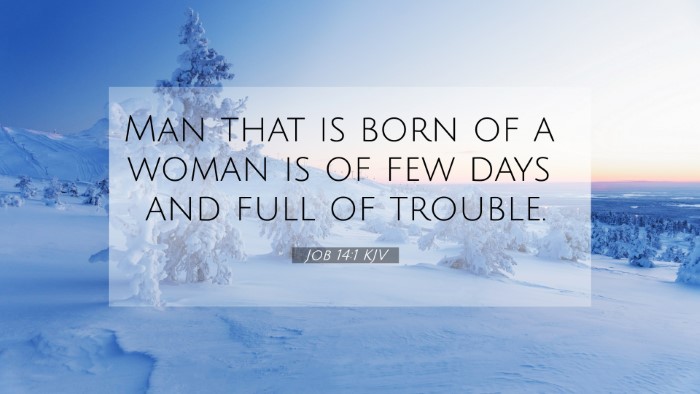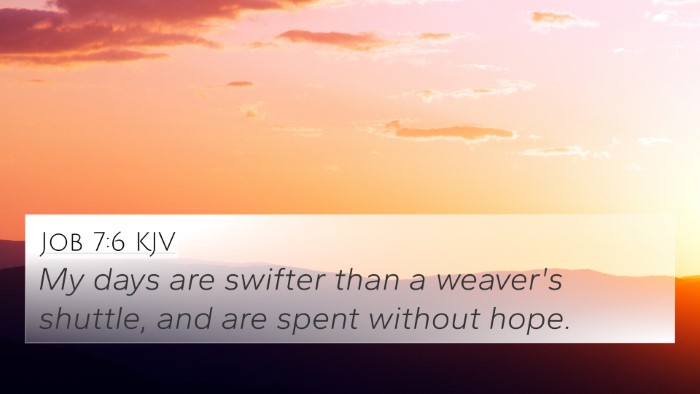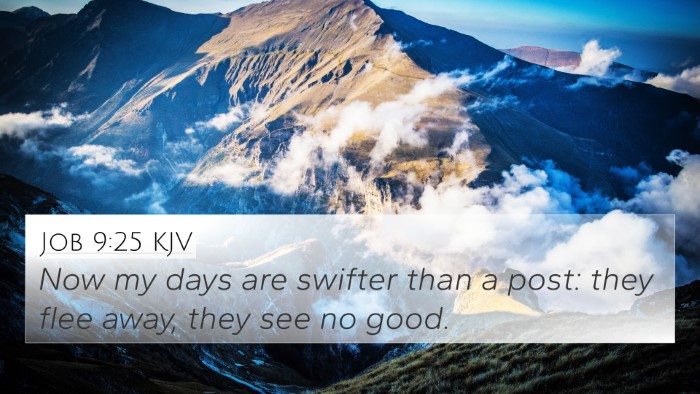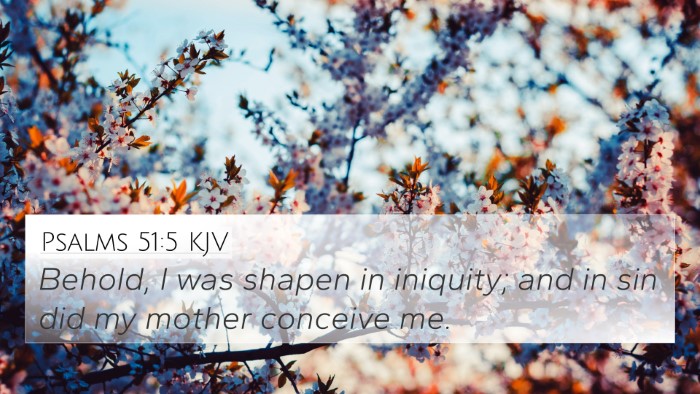Old Testament
Genesis Exodus Leviticus Numbers Deuteronomy Joshua Judges Ruth 1 Samuel 2 Samuel 1 Kings 2 Kings 1 Chronicles 2 Chronicles Ezra Nehemiah Esther Job Psalms Proverbs Ecclesiastes Song of Solomon Isaiah Jeremiah Lamentations Ezekiel Daniel Hosea Joel Amos Obadiah Jonah Micah Nahum Habakkuk Zephaniah Haggai Zechariah MalachiJob 14:1 Similar Verses
Job 14:1 Cross References
Man that is born of a woman is of few days and full of trouble.
Uncover the Rich Themes and Topics of This Bible Verse
Listed below are the Bible themes associated with Job 14:1. We invite you to explore each theme to gain deeper insights into the Scriptures.
Job 14:1 Cross Reference Verses
This section features a detailed cross-reference designed to enrich your understanding of the Scriptures. Below, you will find carefully selected verses that echo the themes and teachings related to Job 14:1 KJV. Click on any image to explore detailed analyses of related Bible verses and uncover deeper theological insights.
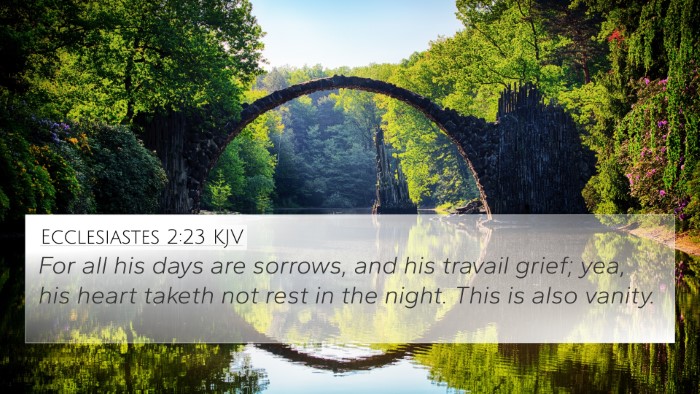
Ecclesiastes 2:23 (KJV) »
For all his days are sorrows, and his travail grief; yea, his heart taketh not rest in the night. This is also vanity.
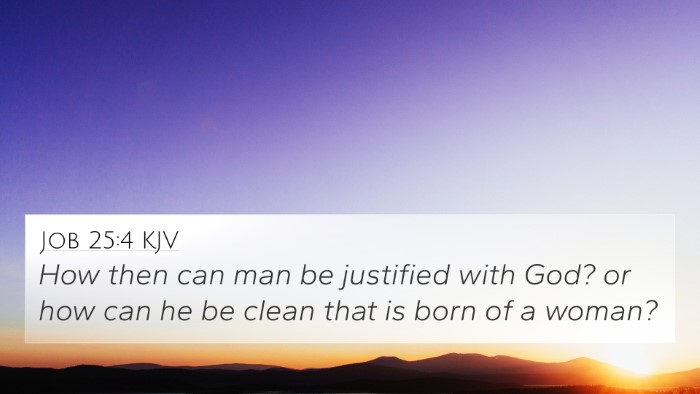
Job 25:4 (KJV) »
How then can man be justified with God? or how can he be clean that is born of a woman?
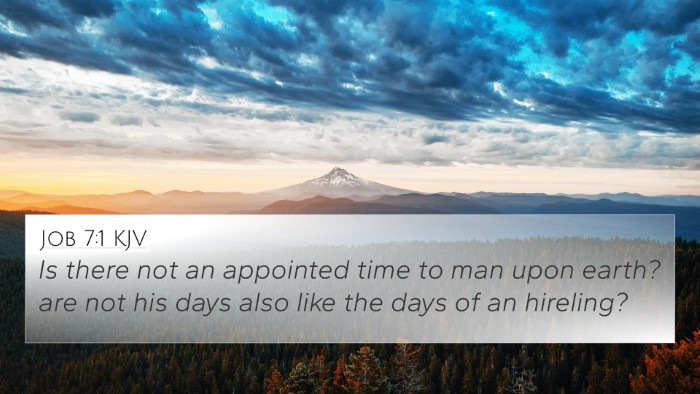
Job 7:1 (KJV) »
Is there not an appointed time to man upon earth? are not his days also like the days of an hireling?
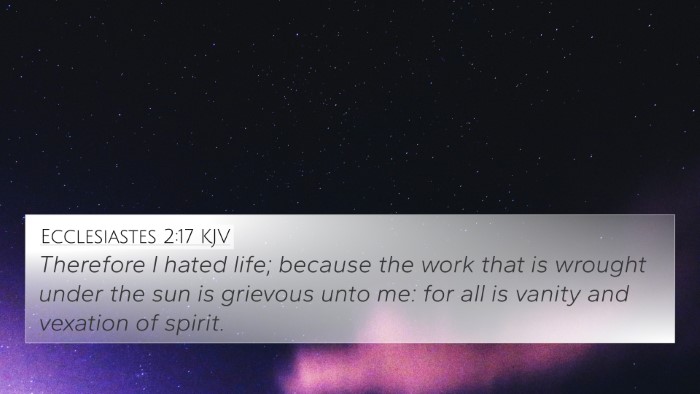
Ecclesiastes 2:17 (KJV) »
Therefore I hated life; because the work that is wrought under the sun is grievous unto me: for all is vanity and vexation of spirit.

Psalms 39:5 (KJV) »
Behold, thou hast made my days as an handbreadth; and mine age is as nothing before thee: verily every man at his best state is altogether vanity. Selah.
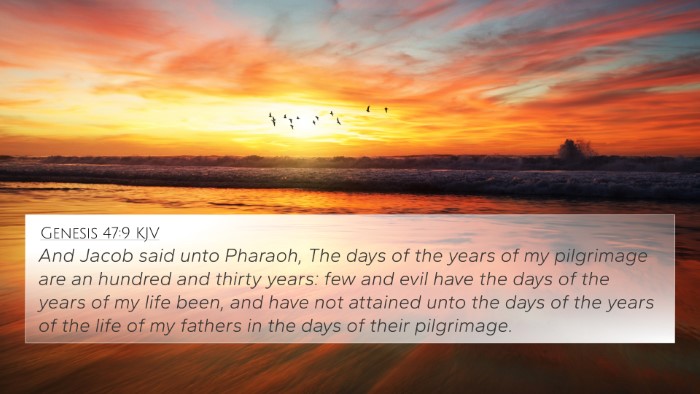
Genesis 47:9 (KJV) »
And Jacob said unto Pharaoh, The days of the years of my pilgrimage are an hundred and thirty years: few and evil have the days of the years of my life been, and have not attained unto the days of the years of the life of my fathers in the days of their pilgrimage.

Job 15:14 (KJV) »
What is man, that he should be clean? and he which is born of a woman, that he should be righteous?
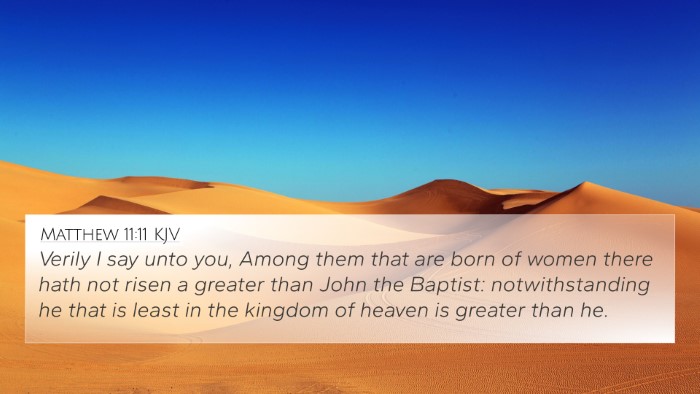
Matthew 11:11 (KJV) »
Verily I say unto you, Among them that are born of women there hath not risen a greater than John the Baptist: notwithstanding he that is least in the kingdom of heaven is greater than he.
Job 14:1 Verse Analysis and Similar Verses
Understanding Job 14:1
Verse: Job 14:1 - "Man that is born of a woman is of few days and full of trouble."
This verse captures the essence of human existence and the inevitable challenges that accompany life. The interpretation of this verse can be greatly informed by prominent public domain commentaries. Below, we summarize insights from the commentaries of Matthew Henry, Albert Barnes, and Adam Clarke, enriching our understanding of the text.
Key Themes and Insights
- Human Frailty: All three commentaries emphasize the significant theme of human frailty. Job, as a figure of intense suffering, encapsulates the transitory nature of life. Matthew Henry notes that life is brief, highlighting the struggle inherent in human existence.
- Inherent Trouble: The phrase "full of trouble" is interpreted to mean that suffering and difficulty are integral to the human experience. Albert Barnes provides insight into how troubles are not isolated but are a universal experience that every individual faces.
- Mortality: Adam Clarke emphasizes mortality's inevitability. The reference to being "born of a woman" reflects the universal condition of humankind, establishing a poignant reminder that all people share the fate of mortality.
- Spiritual Reflection: The verse invites a spiritual reflection on the nature of life and death. Matthew Henry suggests that this acknowledgement of suffering is crucial for understanding our place in the divine narrative.
- Hope and Redemption: While the verse seems bleak, it also opens the door for reflections on the hope found in God. Albert Barnes notes that, despite life's troubles, there is a promise of eventual redemption and comfort found in faith.
Bible Verse Cross-References
Job 14:1 has several connecting verses in the Bible that deepen the understanding of its message:
- Psalms 90:10: "The days of our years are threescore years and ten; and if by reason of strength they be fourscore years, yet is their strength labour and sorrow; for it is soon cut off, and we fly away." This verse mirrors the idea of life's brevity and trouble.
- Ecclesiastes 1:2: "Vanity of vanities, saith the Preacher, vanity of vanities; all is vanity." It parallels the concept of the futility and troubles in human endeavors.
- Job 5:7: "Yet man is born unto trouble, as the sparks fly upward." This emphasizes that trouble is inherent to human life.
- James 4:14: "Whereas ye know not what shall be on the morrow. For what is your life? It is even a vapour, that appeareth for a little time, and then vanisheth away." Similar to Job, it reflects on life's impermanence.
- 1 Peter 1:24: "For all flesh is as grass, and all the glory of man as the flower of grass. The grass withereth, and the flower thereof falleth away." This verse highlights human mortality and insignificance.
- Romans 8:18: "For I reckon that the sufferings of this present time are not worthy to be compared with the glory which shall be revealed in us." This provides a contrast to the troubles mentioned in Job, leading to a hope for greater glory.
- Isaiah 40:6-8: "The voice said, Cry. And he said, What shall I cry? All flesh is grass, and all the goodliness thereof is as the flower of the field." This affirms the transitory nature of human life.
- Matthew 6:27: "Which of you by taking thought can add one cubit unto his stature?" This challenges people to reflect on their worries and life's brevity.
- 2 Corinthians 4:17: "For our light affliction, which is but for a moment, worketh for us a far more exceeding and eternal weight of glory." This verse reminds readers that present troubles have a purpose in the light of eternity.
- Hebrews 9:27: "And as it is appointed unto men once to die, but after this the judgment." This verse highlights the mortal condition of man as articulated in Job 14:1.
Conclusion
The insights derived from the commentaries enhance our comprehension of Job 14:1, enabling the reader to appreciate its depth. By understanding human frailty and the troubles of existence, one may find wisdom in the shared experiences of suffering. Furthermore, the connections to other scriptures allow for a broader thematic understanding of life, mortality, and the hope found within faith.
Utilizing Bible Cross-Referencing
Utilizing tools for cross-referencing can significantly enhance Bible study. A comprehensive Bible concordance or cross-reference guide can help readers discover links between various scriptures, uncovering thematic connections that enrich one’s spiritual journey.
Understanding how to find cross-references in the Bible is essential for those conducting in-depth studies. Identifying connections between the Old and New Testaments, and engaging in a comparative study of the Gospels or discerning links between the prophets and apostolic teachings, provides a holistic approach to scriptural interpretation.
Through the exploration of cross-references, individuals can better grasp how specific Bible verses relate to one another, leading to a more profound understanding of Biblical themes and allowing for enhanced sermon preparation.
